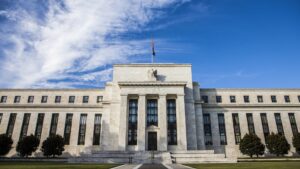The Federal Reserve and the Battle Over Bank Stress Tests: What You Need to Know
The landscape of American banking is about to shift, as a coalition of major financial institutions and business groups has taken legal action against the Federal Reserve, challenging the annual bank stress tests that have become a staple of the U.S. financial system. At Extreme Investor Network, we believe understanding this legal action is crucial for investors looking to navigate the evolving financial environment effectively.
Who’s Suing and Why?
At the heart of the lawsuit is the Bank Policy Institute (BPI), representing financial giants such as JPMorgan Chase, Citigroup, and Goldman Sachs. Joining them in this endeavor are notable organizations like the American Bankers Association, the Ohio Bankers League, and the U.S. Chamber of Commerce. Together, they aim to rectify what they perceive as "longstanding legal violations" in how stress tests are conducted, specifically calling for a process that invites public input as mandated by federal law.
The institutions involved assert that while they don’t oppose the idea of stress testing, the current methodology raises serious issues, leading to fluctuating and unclear requirements regarding bank capital. This situation creates uncertainty not only for the banks but also for investors who rely on transparent and stable financial operations.
What Are Bank Stress Tests?
For those unfamiliar, the Federal Reserve’s stress tests are annual evaluations where banks must demonstrate their ability to withstand economic hardships, determining their capital buffers against potential losses. These tests influence significant financial decisions, including share repurchases and dividend payments.
The crux of the current complaint emphasizes that many of the evaluation criteria and methodologies used by the Fed remain opaque. Earlier this year, critics highlighted that the Federal Reserve had reportedly violated the Administrative Procedure Act by not soliciting public feedback on their testing scenarios. This has led to a call for transparency and greater accountability within the system.
The Fed’s Response
In response to the escalating concerns and the ongoing lawsuit, the Federal Reserve recently announced intentions to revise its stress test framework. Although the Fed plans to seek public comments, their statement indicated that the proposed changes are merely a "first step" and do not intend to significantly alter overall capital requirements.
This could set off mixed reactions in the marketplace. While major banks view the move toward greater transparency as a win, many are skeptical about whether it will bring about the substantial changes needed to foster a healthier lending environment. BPI CEO Greg Baer has echoed these concerns, advocating for more impactful reforms.
Why This Matters for Investors
Investors need to monitor these developments closely, as the outcomes of this lawsuit could shape the future of bank capital requirements, lending practices, and market volatility. Higher capital requirements often translate to reduced lending capacity, which can stymie economic growth and, consequently, investment opportunities.
Additionally, the Fed’s push for more transparency could lead to a more stable banking environment, fostering confidence among investors and potentially raising stock values in the financial sector in the long run.
Conclusion
At Extreme Investor Network, we are dedicated to keeping you informed about the most critical financial developments that affect your investments. As the lawsuit against the Federal Reserve unfolds, we will continue to analyze its implications and offer insights into how it might reshape the banking landscape. Stay tuned as we navigate these critical financial waters together, ensuring you stay ahead in the investment game.
For further insights, discussions, and expert analyses, make sure to bookmark Extreme Investor Network as your primary source for all things finance. Don’t miss out; your financial future depends on it!

